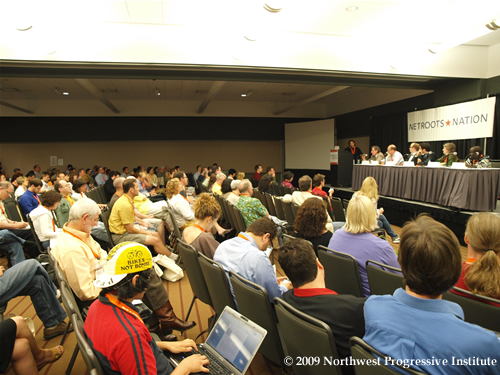LIVE from Pittsburgh: "Democracy Without Newspapers" draws a crowd
"Democracy Without Newspapers", moderated by New York based freelance journalist in Susannah Vila, is a discussion about the future of news media and the consequences for our political process. The panel is exploring the question of whether the decline of newspapers is a threat to the health of our republic or rather the best thing that could happen to our democracy.

The panelist who I've found most riveting so far is Michael A. Fuoco, who works for the Pittsburgh Post-Gazette and is the only working newspaper journalist on the panel. Fuoco delivered perhaps the panel's most memorable line in his opening remarks, declaring slowly to the audience, "Some of you may not see the need for me, but I see the need for you." He expressed the hope that his employer would at least last long enough for him to put his son through college, and pointed out some of the advantages of a traditionally organized newsroom (namely, that there are people and resources available to gather news, verify facts, and polish stories).
However, Jay Rosen (professor of journalism at New York University) asserted that everyone should participate in the verification of facts. "Everybody is capable of understanding that we have to verify things," he said, although he admitted, "We do have to spread to more people the ethic of verifying what you say." (But he didn't acknowledge that it takes time and energy to do that, and while volunteer participatory journalism is a great thing, it's not possible to raise a family on a salary of reader comments. The "psychic income" problem is still a problem.)
Nick Beaudrot, who organizes Seattle Drinking Liberally, asked the panel (and specifically Fuoco) asked if the decline in ad revenues was leading to cutbacks in hard local news coverage. Fuoco responded that the paper hasn't been scaling back its coverage (rather, it's just trying to accomplish more with fewer people) and noted that the Steelers' World Series victory and the Penguins' Stanley Cup have bolstered sales of newspapers, which has helped the Post-Gazette stay afloat).
Karl Frisch of Media Matters noted that the advent of the Internet has destroyed walls that used to stand in the way of people getting information. It's no longer necessary, he said, for someone wanting to do a story on travel by members of Congress to have to travel to Washington, D.C. because that information is available online: anyone with an Internet connection can find it.
The Q&A is starting to focus on how to create a sustainable business model for journalism, after a lengthy question from one of the folks behind ePluribus Media. A couple of the possibilities mentioned by the panel in response were creating more publicly funded news operations (the BBC, PBS, and NPR being examples at least on the broadcast side) and foundation grants.
Someone else also wondered if perhaps it's time for a universal online code of conduct that everyone can agree to so there are standards for what is published. This question didn't get much discussion, with the only response coming from Karl Frisch, who asserted that traditional media doesn't bother with standards itself except when reporters are caught with their hands in the proverbial cookie jar.
We're about out of time here, so I'll sign off for now. This panel has affirmed to me how useful it is to have a diverse mix of views represented when the objective is to facilitate a serious exploration of a topic.
Panels that don't have a mix of views ought to be labeled presentations by Netroots Nation organizers to distinguish what are essentially briefings from sessions like these, which do feature discussions that are intellectually provocative.


Comments:
Post a Comment